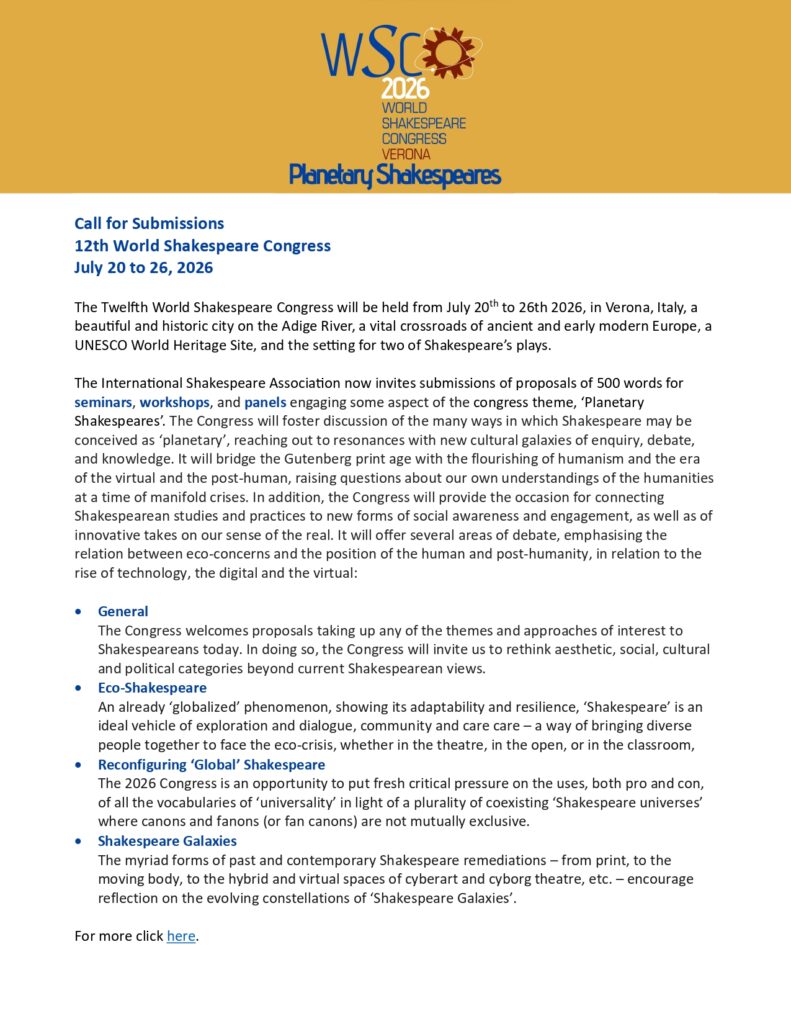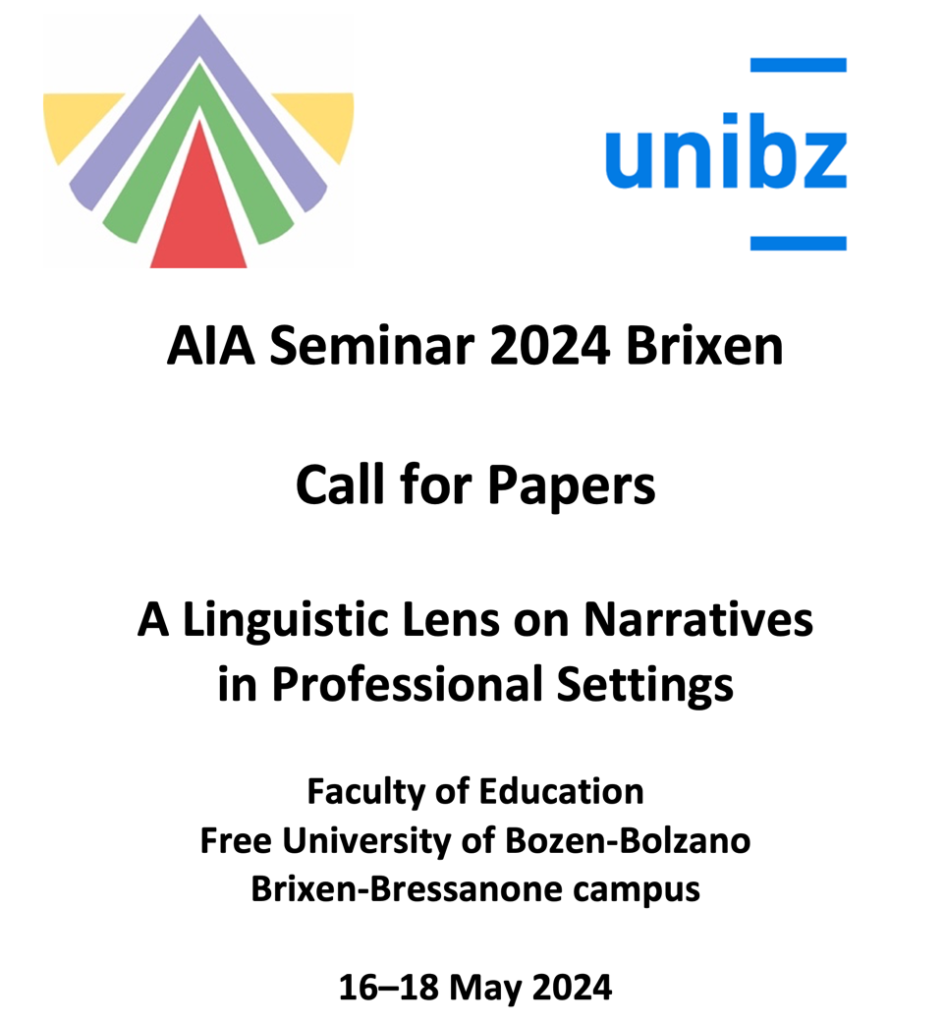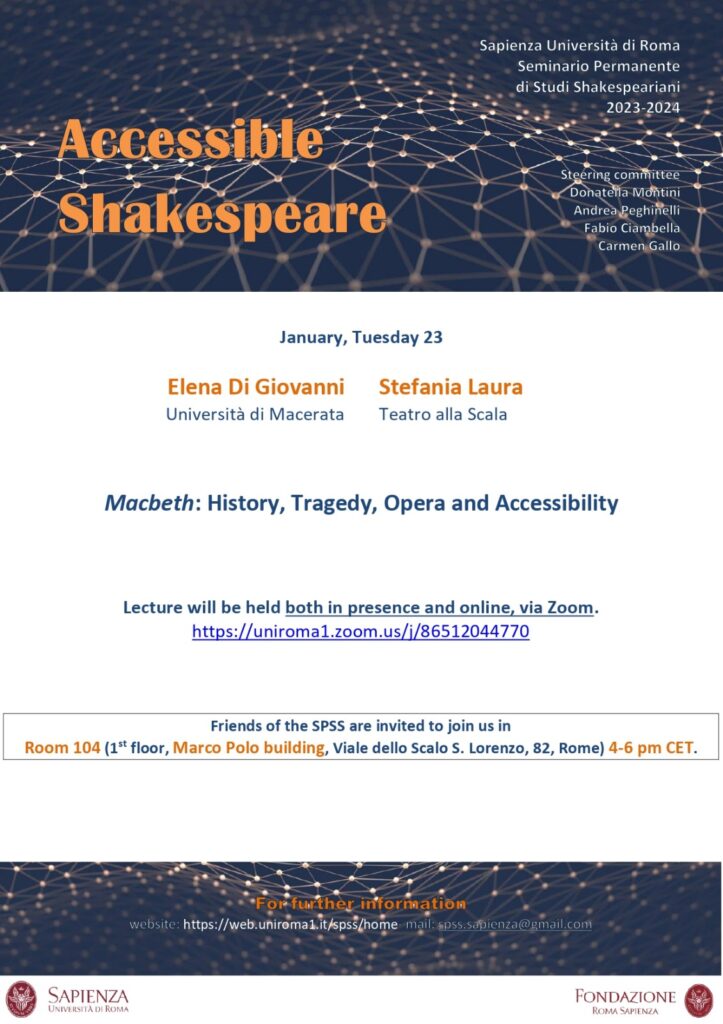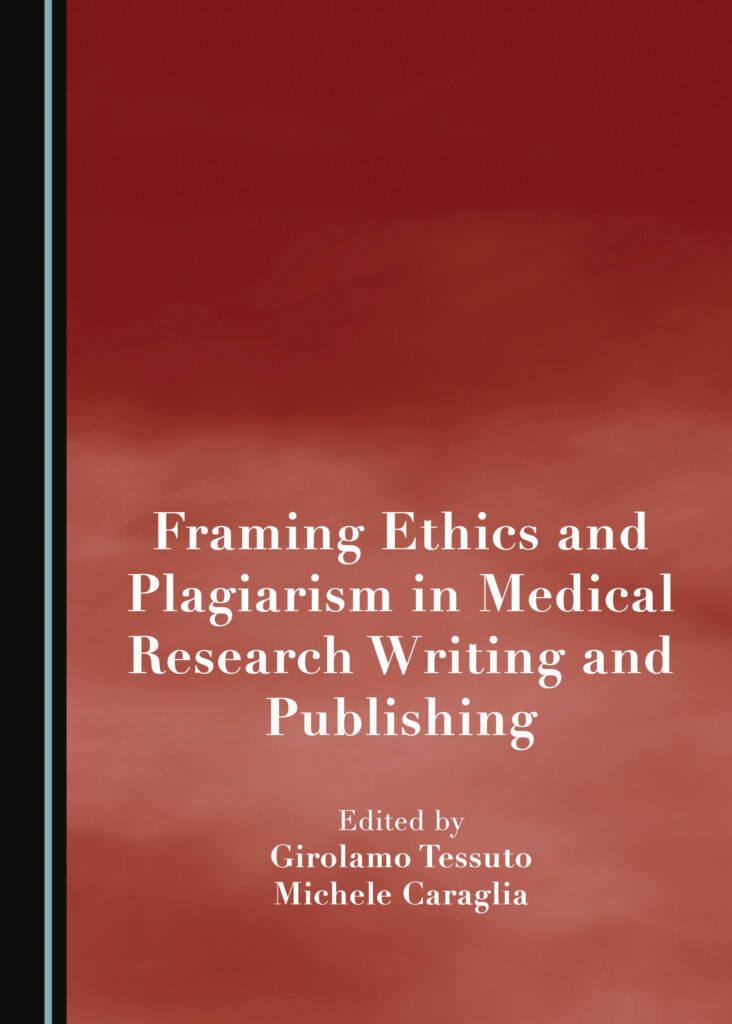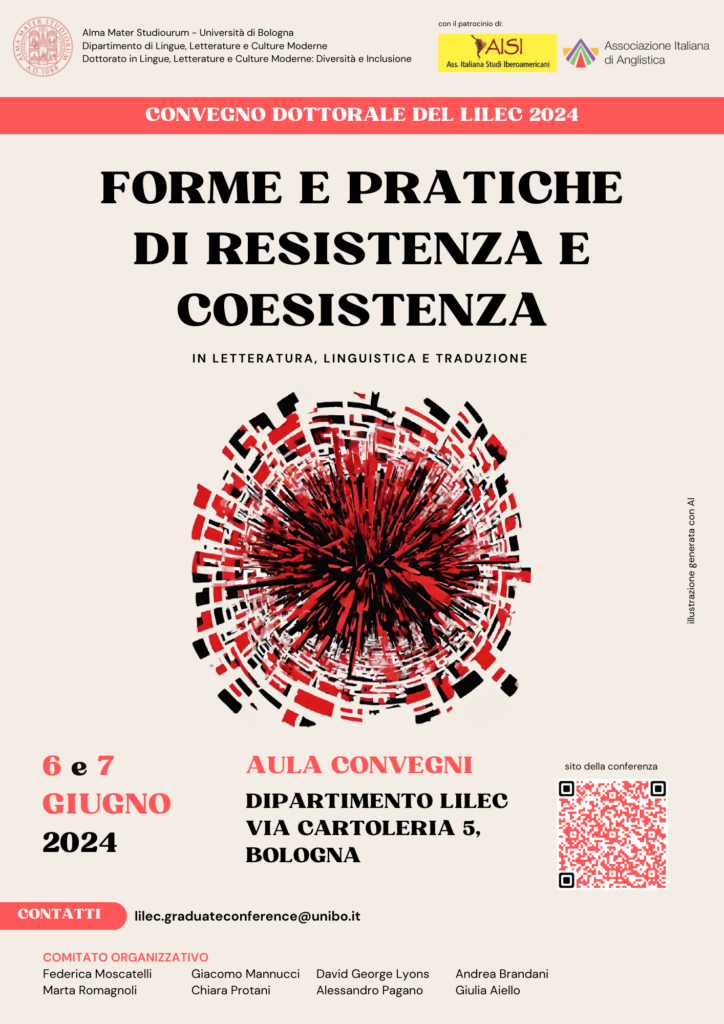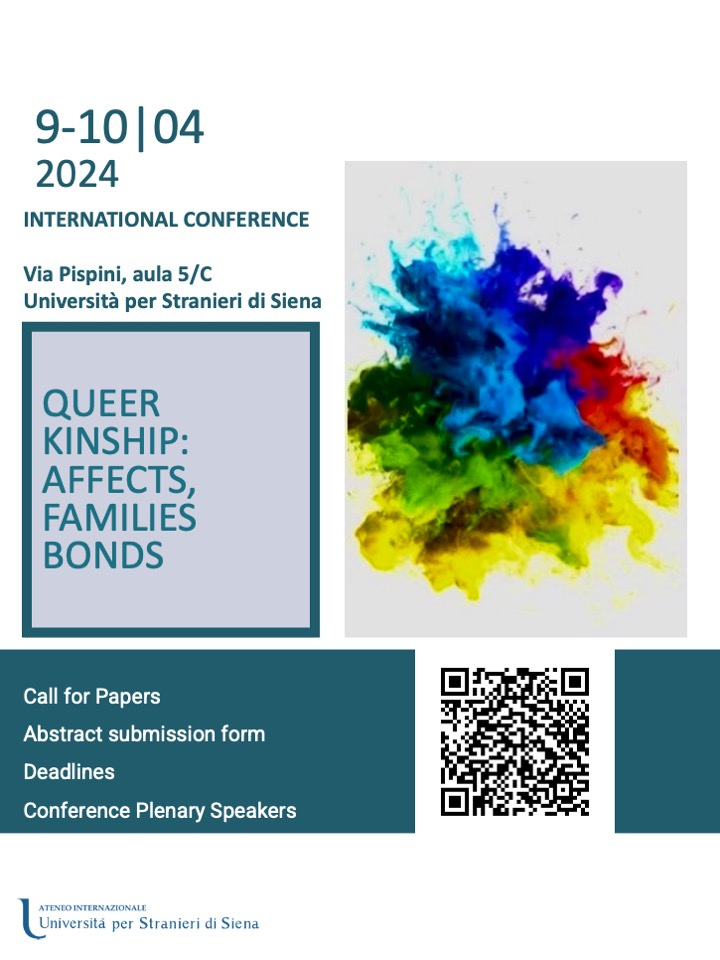Queer Kinship: Affects, Families, BondsUniversity for Foreigners of Siena9-10 April 2024 In recent decades, critical, cultural, political and legal discourses on the family have undergone significant shifts leading to new perspectives on the ways in which societies conceive of, recognise and experience affective bonds. New legislation, such as civil partnerships, same-sex marriages and increased access to technologies of reproduction, have enabled new family forms to be established and legitimised. Cultural representation of these new families has increased their visibility and shone new light on “alternative” affective forms of co-existence. However, the queer family is not a new phenomenon, and many modalities of queer kinship, beyond legal family structures, or the pervasive norm of the ‘couple’, have existed for a considerable time: these include, for example, so-called romantic friendships, Boston marriages, polyamorous communities, queer kinship groups, fillus de anima and many other different forms of affective ties that may change across the life course. Due to discrepancies in law and problematic socio-cultural attitudes, certain forms of queer kinship, or kinships between certain individuals, are more culturally accepted and officially recognised than others, resulting in intersectional discrimination. While there is a significant body of academic work that explores some of these questions from a sociological, anthropological and legal perspective, as yet there is little sustained analysis of the developing cultural discourses and representation both in individual contexts and across national linguistic and social contexts. The transcultural and transnational circulation of discourses on queer families and kinship has yet to be fully assessed and investigated. A deeper understanding of these cultural discourses, in relation to their socio-cultural, political and legal context, is crucial to improving our awareness of the experiences, knowledge, innovative practices and wellbeing of those who choose to diverge from the script of the heteronormative family. This international conference aims to open up a space for critical debate on these issues and to develop interdisciplinary scholarly networks. It is the first of three conferences on this theme that will be held in 2024-2025, in Siena (Italy), Birmingham (UK) and Toronto (CA). The three conferences constitute different stages of a research project on affective bonds and queer families from an inter- and transdisciplinary perspective, which seeks to identify emerging trends in cultural representation, and to develop new methodologies for analysing socio-cultural and discursive phenomena in a plural, multicultural and inclusive optic. The main focus for this conference will be cultural texts and discourses, from the late 19th century onwards. The conference will lead to the publication of an edited volume in English with an international publisher. Themes for discussion include (but are not limited to): Same-sex, trans or non-binary parents and technologies of reproduction; Queer parenting and its impact on gender roles and cultural norms; LGBTQ+ children’s experiences within the family structure; Queer kinship beyond the couple norm; Childless adults and their affective ties; Queer communities; Polyamory; The impact of racialisation on queer families and communities; Multigenerational kinship; The relationship between different textual genres, e.g. novels, memoirs, self-help books, YouTube channels, films; Critical and theoretical discourses on queer families and related issues; Intercultural and interlinguistic translations and transpositions of queer kinship. Confirmed plenary speakers are: Prof. Simonetta Grilli (University di Siena) Prof. Maria Federica Moscati (University of Sussex) Prof. Nicoletta Vallorani (University of Milan) Please submit a 250-word abstract plus a brief bio (max 100 words) by 29th February 2024 via this form: https://forms.gle/Jz1JYCNX5i1HiasL9 For any information, please contact Silvia Antosa: silvia.antosa@unistrasi.it Speakers will receive a notification of confirmation by March 5th 2024. The languages of the conference will be English and Italian. There will be no conference fees. This is an in-person event. Conference organising committee: Silvia Antosa (University for Foreigners of Siena, Italy) Paolo Frascà (University of Toronto, CA) Charlotte Ross (University of Birmingham, UK) Essential Bibliography: Sarah Ahmed, Queer Phenomenology: Orientations, Objects, Others, Duke University Press, Durham, 2006. Sarah Ahmed, The Promise of Happiness, Duke University Press, Durham, 2010. Judith Butler, “Is Kinship Always Already Heterosexual?”, Differences: A Journal of Feminist Cultural Studies, XIII, 1 (2002), pp. 14-44. Judith Butler, Undoing Gender, Routledge, New York-London 2004. Lisa Duggan, “The New Homonormativity: The Sexual Politics of Neoliberalism”, in Russ Castronovo and Dana D. Nelson, Materializing Democracy: Toward a Revitalized Cultural Politics, Duke University Press, Durham 2002, p. 175-194. Lee Edelman, No Future: Queer Theory and the Death Drive, Duke University Press, Durham 2004. David L. Eng, The Feeling of Kinship: Queer Liberalism and the Racialization of Intimacy, Duke University Press, Durham 2010. Elizabeth Freeman and Tyler Bradway (eds), Queer Kinship: Race, Sex, Belonging, Form, Duke University Press 2022. Jacqui Gabb and Janet Fink, Couple Relationships in the 21st Century, Basingstoke, Palgrave Macmillan 2015. Susan Golombok, Modern Families: Parents and Children in New Family Forms, Cambridge University Press, Cambridge, 2015. Robert E. Goss, Amy Adams Squire Strongheat (eds), Our Families, Our Values: Snapshots of Queer Kinship, Harrington Park Press, New York 1997. Roberto Kulpa, Joanna Mizielinska, Agata Stasińska, “(Un)Translatable queer? Or what is lost, and can be found in translation”, in Sushila Mesquita et al. (eds), IMPORT – EXPORT –TRANSPORT. Queer Theory, Queer Critique and Activism in Motion, Zaglossus, Vienna 2012, pp. 115–147. James Heckert et al. (eds), Mapping Intimacies: Relations, Exchanges, Affects, Palgrave Macmillan, Basingstoke 2013. Stephen Hicks, Lesbian, Gay and Queer Parenting: Families, Intimacies, Genealogies, Palgrave Macmillan, Basingstoke 2011. Valerie Lehr, Queer Family Values: Debunking the Myth of the Nuclear Family, Temple University Press, Philadelphia 1999. Laura McKenzie, Age-Dissimilar Couples and Romantic Relationships: Ageless Love?, Palgrave Macmillan, Basingstoke 2015. Joanna Mizielinska, Jacqui Gabb and Agata Stasinska (eds), Queer Kinship and Relationships, Special issue of Sexualities, XXI, 7 (2018). Jasbir Puar, Terrorist Assemblages: Homonationalism in Queer Times, Duke University Press, Durham 2007. Sasha Roseneil, Isabel Crowhurst, Tone Hellesund, Ana Cristina Santos, and Mariya Stoilova (eds), The Tenacity of the Couple-Norm: Intimate Citizenship Regimes in a Changing Europe, London, UCL Press 2020. David Schneider, American Kinship: A Cultural Account, University of Chicago Press, Chicago 1968. David Schneider, A Critique of the Study of Kinship, University of Michigan Press, Ann Arbor 1984. Thomas Strong, “Kinship Between Judith Butler and Anthropology? A Review Essay”, Ethnos, LXVII, 3 (2002), pp. 401-418. Warren Shapiro, “The Old Kinship Studies Confronts Gay Kinship: A Critique of Kath Weston”, Anthropological Forum, XX, 1 (2010), pp. 1-18. Kath Weston (ed.) Families We Choose: Lesbians, Gays, Kinship, Columbia University Press, New York 1991.

